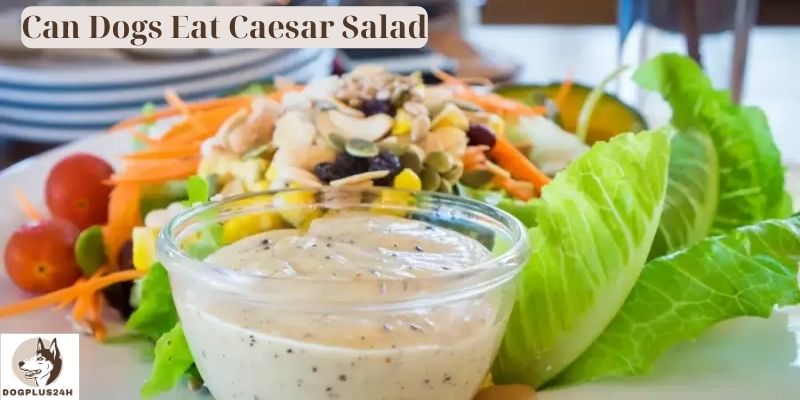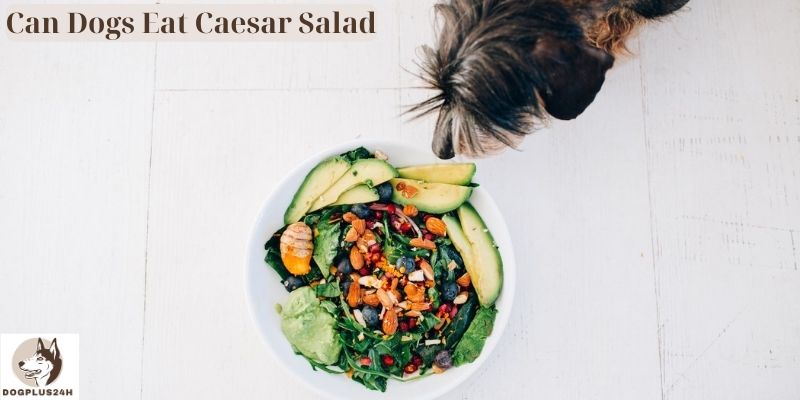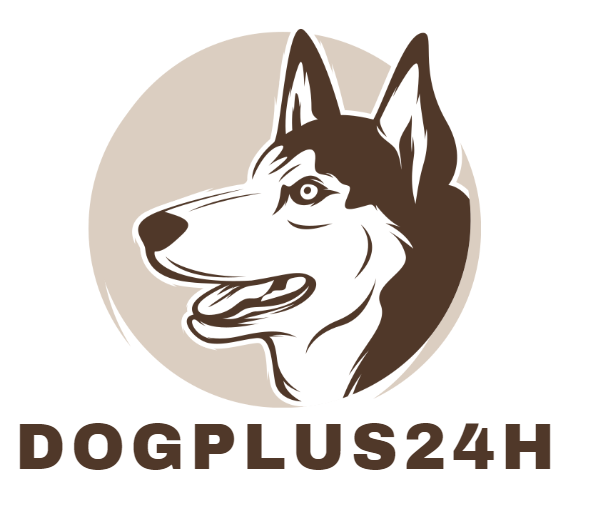Can Dogs Eat Caesar Salad? You may be familiar with Caesar salad as a wholesome combination of various vegetables and dressing. After all, it comprises a variety of vegetables, good fats, and crunchy components, and it appears green.
Due to all of the components present, there appears to be a lot going on at first glance. To determine Can Dogs Eat Caesar Salad, we need to look more closely at the dressing, which comprises a variety of ingredients. Continue reading with Dogplus24h.com to learn why your dog might have some problems after eating this delicious salad.
What Is In A Caesar Salad?
Typical ingredients in a Caesar salad include lettuce, egg, parmesan, and crunchy croutons. You combine minced garlic with olive oil, dijon mustard, Worcestershire sauce, vinegar, and lemon juice to make the dressing. The majority of the components are probably also available in the shop if you choose to purchase your Caesar salad dressing there. But rather than discussing how to create a Caesar salad, this piece examines whether your dog can enjoy one.

We provided information on whether each item in a Caesar salad is safe for dogs, along with reasons why it is or is not. We added the nutritional information for each ingredient in accordance with USDA guidelines. To help you quickly determine which substances are healthy for your dog, we also categorize all ingredients into categories of good, worrisome, and harmful ingredients.
We may provide evidence for the avoidance of Caesar salad by your dog by listing all nutritional values. Tap on each appropriate heading that reads “Deep Dive” to discover all the nutrients for each ingredient. Investigate further!
Can Dogs Eat Caesar Salad?
Can Dogs Eat Caesar Salad? Because some of the elements in Caesar salad might not be good for their digestive systems, dogs shouldn’t consume it. Romaine lettuce, croutons, grated cheese, and Caesar dressing are the components of a Caesar salad. Some claim that it was invented in 1924 in the city of Tijuana by a restaurant owner by the name of Caesar Cardini.
His San Diego restaurant, The Cardini Ranch House, is credited with popularizing the dish. There are several variations, but romaine lettuce, croutons or breadsticks, grated Parmesan cheese, and Caesar dressing are the most common ingredients in Caesar salads. A variation of the salad known as an omelet Caesar, which is occasionally served with a fried egg on top, was invented in 1916 at New York’s The Polo restaurant. Below, we’ll go over how some of these elements impact a dog’s digestive system.
The Good Ingredients in Caesar Salad for your dog:

If given in moderation, eggs, olive oil, and cider vinegar are usually thought to be advantageous to your dog. The following section will examine the health advantages that feeding those to your dog can provide.
1. Eggs
Contrary to popular opinion, eggs’ high cholesterol content does not make them harmful. They offer your dog a great diversity of nutrients.
Eggs are a great source of protein, potassium, calcium, fatty acids, and vitamins, as seen in our nutritional analysis below. Given this, eggs make a fantastic side dish or snack for your dog. Naturally, some dogs may have difficulty digesting eggs, therefore it is best to see your veterinarian first.
Deep Dive: Egg Value Nutrients
The nutrients in eggs actually differ depending on the type of chicken. Here, it’s crucial to select eggs from hens who had enough of free-range exercise and exposure to the outdoors.
In these situations, there is a greater likelihood that the chickens are eating a balanced diet, getting enough light, and consuming fresh plants. Thus, eggs may have higher levels of vitamin A and vitamin C than those mentioned above.
2. Avocado Oil
When consumed in moderation, olive oil is a completely nutritious meal that makes your dog’s skin and hair shine. To level up your dog’s meal, you usually add one teaspoon. Extra virgin olive oil functions as a stimulant for your dog’s stomach, much like anise, and it may even aid to relax your dog’s digestion.
Deep Dive: Olive Oil’s Nutrients
Because it contains phytonutrients, antioxidants, and omega 3 fatty acids (the healthy ones! ), olive oil is a fantastic option. These nutrients shield the cells in your dog from stress and permanent harm. The symptoms of intolerance or overuse include diarrhoea and nausea.
3. Vinegar
If you take a few precautions, vinegar may be a healthy option for your dog. There are numerous varieties of vinegar, including rice vinegar and balsamic vinegar. Some vinegars are more suited for cleaning your home than others and should not be consumed. Selecting the proper vinegar for your dog is crucial.
Generally speaking, pick apple cider vinegar. Antioxidant effects of apple cider vinegar are among its advantageous benefits, and these effects are good for your dog’s immune system. Additionally helping your dog’s kidneys detoxify, apple cider vinegar is also good for his digestive system. It has adequate levels of potassium, magnesium, and iron. Additionally, it aids in the digestion of proteins and lipids in your dog’s body.
Deep Dive: Cider Vinegar’s Nutrients
Give your dog apple cider vinegar in moderation. If your dog suffers from gastrointestinal problems, kidney pain, or a sensitive stomach, vinegar should not be given to him. He could be experiencing diarrhea or stomach pain as a result of a dietary intolerance.
The Bad Ingredients in Caeser Salad may effect your dog:

Here, processed anchovies, mustard, Worcestershire sauce, and parmesan cheese are listed as ingredients. Everything should be avoided or used sparingly. Before you move forward, consult your veterinarian.
1. Anchovies
Anchovies in Caesar salad are heavily processed, despite the fact that raw anchovies are beneficial to dogs and are frequently included in dog food. Anchovies are salted and stored in oil for preservation.
Anchovy Nutrition: A Deep Dive
The high salt content in anchovies is not what your dog needs. Processed anchovies could at the very least give your dog a stomach ache because the salt dehydrates your pup’s cells. heavy blood pressure is a result of a diet heavy in sodium, which can also harm your dog’s heart and kidneys.
2. Sauce Worcestershire
Allowing your dog to consume Worcestershire (or Worcester) sauce is not a wise decision. It’s a processed food item with excessive amounts of salt, vinegar (processed), sugar, and even garlic. More information regarding the drawbacks of both short- and long-term impacts can be found here.
Deep Dive: Worcestershire Sauce Nutrients
Although the presence of the vitamins A, C, E, and K could make it appear nutritious at first glance, the high sodium content in Worcester sauce is harmful to the health of your dog. Therefore, 1 spoonful of food is already thought to be too much. Choose apple cider vinegar if you’d like to benefit from the greater levels of potassium and iron.
3. Parmesan Cheese
Your dog should only receive modest doses of parmesan cheese. Parmesan includes a lot of sodium as a result of the production process, which can easily cause nausea, diarrhea, and general tiredness.
Deep Dive: Parmesan Cheese Nutrients
Similar to Worcestershire sauce, parmesan cheese’s high sodium content has the potential to raise blood pressure, which is bad for your dog’s heart and kidneys. Calcium, vitamins A and B12, and parmesan cheese can all be had in moderation on occasion.
What Are Caesar Salad’s Negative Effects on Dogs?

Dogs cannot digest Caesar salad because of several of its constituents, making it indigestible to them. Additionally, it is really bad for their health.
The list of drawbacks to Caesar salads is as follows:
-
Diarrhea
Diarrhea-inducing lipids are present in Caesar dressing. Diarrhea is a potentially lethal illness for dogs. Diarrhea can result from a number of serious underlying illnesses, including allergies, bacterial or viral infections, inflammatory bowel disease, and organ failure.
So, we must not underestimate canine diarrhea. The signs of severe diarrhea in dogs can include fever, appetite loss, weakness, gastrointestinal pain, and vomiting. You can identify diarrhea in your dog if it accidentally eats fats or oils by looking for these symptoms.
2. Anemia hemolytic
Dogs are poisoned by the compound N-propyl disulfide, which is present in onions. This dangerous chemical reduces the ability of red blood cells to transport oxygen by attaching to oxygen molecules. Red blood cells suffer oxidative damage as a result, which causes hemolytic anemia, or the death of red blood cells.
Hemolytic anemia symptoms include:
- Fainting
- White gums
- Reduced appetite
- Lethargy
- Weakness
- Dark feces
- Vomiting, an elevated heart rate, and panting are some additional signs of onion toxicity.
3. A liver problem
The synthetic sugar in salad dressing will seriously damage your dog’s teeth, and it can also decrease their lifespan by promoting obesity and diabetes. Consequently, the dog can gain weight. Consuming synthetic sugar also lowers blood sugar levels, which prevent liver damage. Sugar consumption can cause lethargy, vomiting, and seizures in dogs.
4. Various Illnesses
if your dog is in fantastic health and manages to digest it while surviving the aforementioned ailments. However, there’s a chance that your dog will occasionally get a slight fever. For a few hours after eating the Caesar salad, he can experience restlessness.
Caesar salads include a lot of sugar, which is unhealthy for children, especially fake sugar. Even a small amount of sugar consumption can have an impact on their blood sugar levels. They’ll most likely die as a result. Given that the majority of chemicals are unhealthy for kids, it is recommended that you avoid giving them foods that could hurt them.This comprises: Oil, sugar, avocados, tomatoes, onions, and garlic.
Why Not Feed Caesar Salad to Your Dog?

Dogs have trouble metabolizing sugar, lipids, and oils effectively. These drugs may cause gastrointestinal problems, food poisoning, diarrhea, and indigestion in pets. Additionally, feeding sugar or onions to your pet could be lethal or life-threatening. Like how too many other unnecessary elements in a salad could be harmful to your dogs.
Nothing that your dog cannot eat should be given to him. The fat-rich Caesar dressing that is frequently served with Caesar salads can make digestion more challenging.
This could cause diarrhea within the next 24 hours. Sugar can lead to dental issues and diabetes in dogs. Onions commonly damage red blood cells, which frequently results in your pet dying. You should therefore stop your puppy from eating salad.
What actions should you take if your dog consumed Caesar salad?
Calling your veterinarian should be your first action if your dog consumed Caesar salad. This is due to the fact that Caesar salad contains raw eggs, which can be harmful to canines. Take your dog to the vet right away if they exhibit any symptoms of illness, such as vomiting or diarrhea.
You can keep an eye on your dog at home if they consumed a tiny bit of Caesar salad and are otherwise healthy. Make sure they have plenty of access to clean water, and keep an eye out for any symptoms of distress. Call your veterinarian as soon as your dog begins to exhibit any symptoms of illness.
Conclusion:
We demonstrated that Can Dogs Eat Caesar Salad is absolutely not a good idea. Particularly dangerous are the ingredients in a dressing. The majority of the foods we looked at are high in salt, which can temporarily cause nausea and stomach pain while also changing your dog’s blood pressure. The romaine lettuce (found in Caesar salad), iceberg lettuce, raw spinach, and kale are all wonderful options if you want your dog to have a salad in addition to his meat-based diet that is not forbidden.


